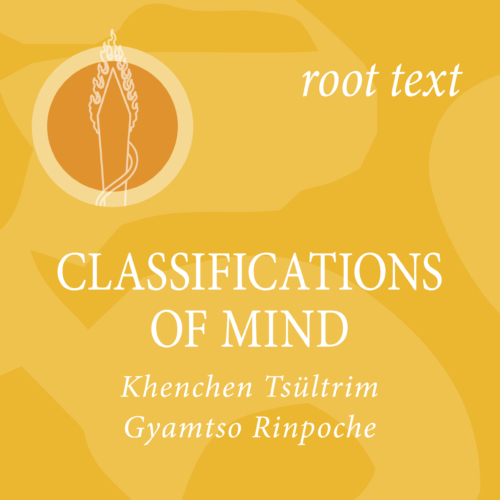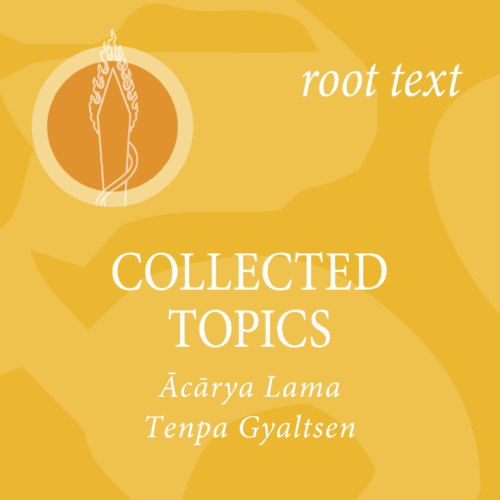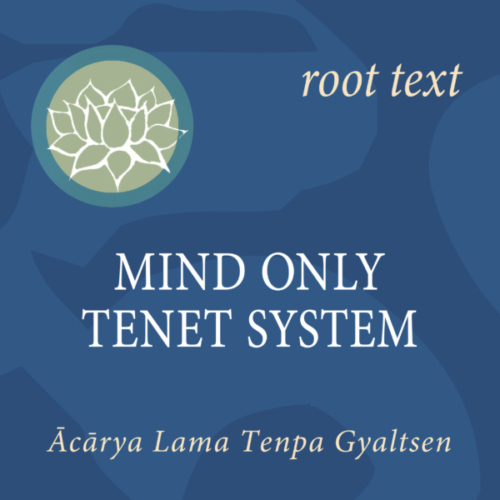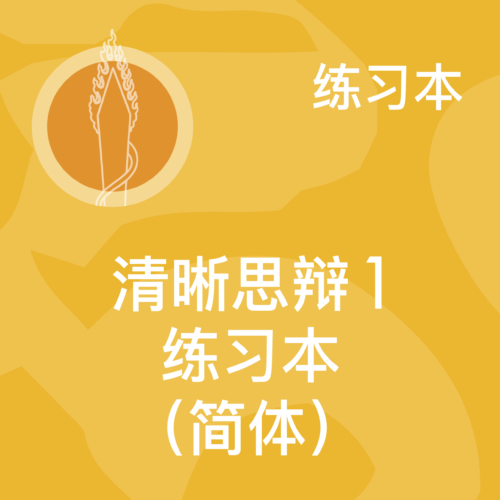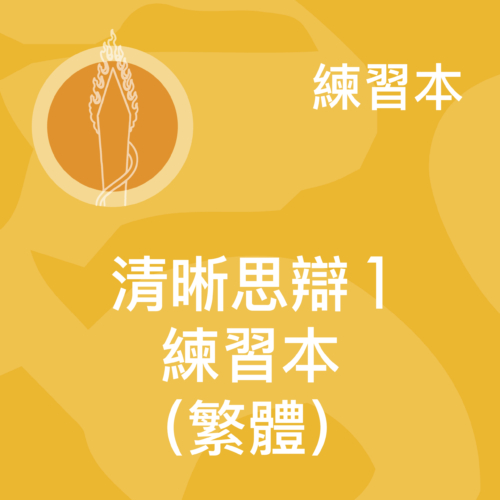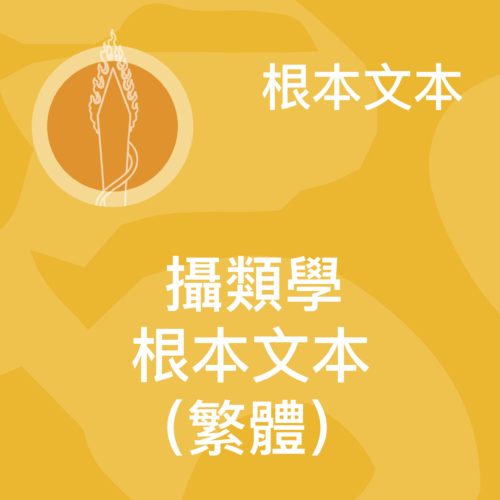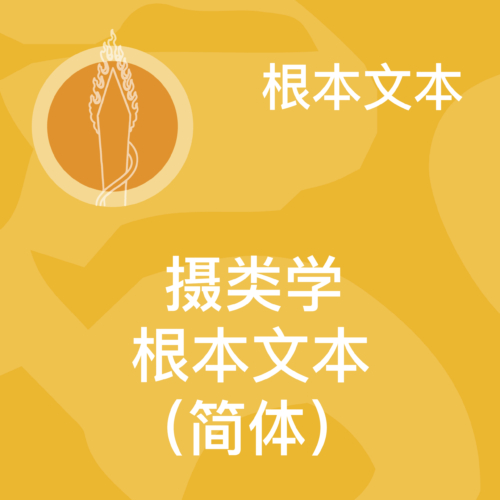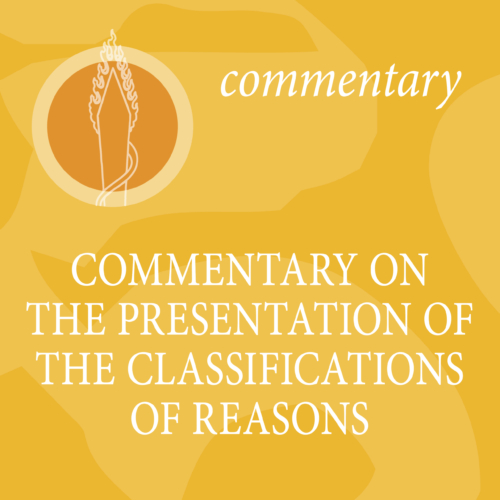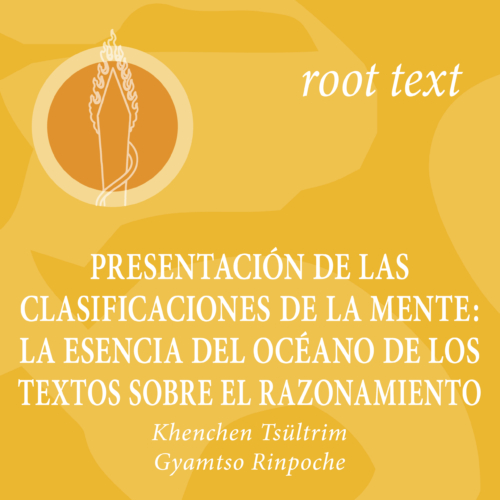-
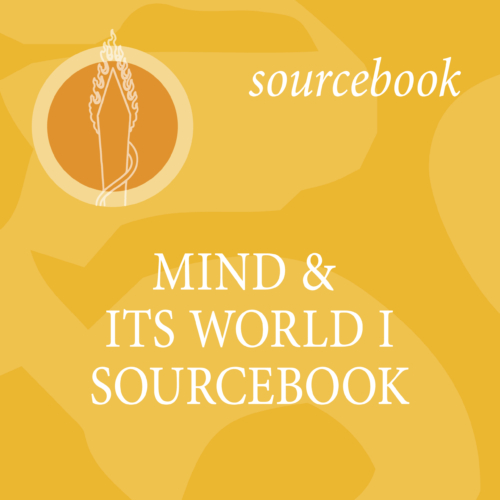 Also available as an eBook for Apple and Google. Mind and Its World I begins a detailed analysis of the subjective side of experience. It examines mind and how it perceives its world in valid and invalid ways based on the Classifications of Mind, which provides divisions and definitions of the types of mind identified in the epistemological tradition of Dignaga and Dharmakirti. The key point is the discernment of the aspects of mind that validly perceive things the way they are, which are distinguished from those aspects of mind that are mistaken and tainted by fundamental delusion, and thus keep one bound in samsara. It also introduces the two Hinayana philosophical systems, the Vaibhashika and Sautrantika schools, covering the two truths and the process of perception. Selected readings, analytical meditations, study questions, review summaries are included in the sourcebook.
Also available as an eBook for Apple and Google. Mind and Its World I begins a detailed analysis of the subjective side of experience. It examines mind and how it perceives its world in valid and invalid ways based on the Classifications of Mind, which provides divisions and definitions of the types of mind identified in the epistemological tradition of Dignaga and Dharmakirti. The key point is the discernment of the aspects of mind that validly perceive things the way they are, which are distinguished from those aspects of mind that are mistaken and tainted by fundamental delusion, and thus keep one bound in samsara. It also introduces the two Hinayana philosophical systems, the Vaibhashika and Sautrantika schools, covering the two truths and the process of perception. Selected readings, analytical meditations, study questions, review summaries are included in the sourcebook. -
 (ESPAÑOL) Mind and Its World I begins a detailed analysis of the subjective side of experience. It examines mind and how it perceives its world in valid and invalid ways based on the Classifications of Mind, which provides divisions and definitions of the types of mind identified in the epistemological tradition of Dignaga and Dharmakirti. The key point is the discernment of the aspects of mind that validly perceive things the way they are, which are distinguished from those aspects of mind that are mistaken and tainted by fundamental delusion, and thus keep one bound in samsara. It also introduces the two Hinayana philosophical systems, the Vaibhashika and Sautrantika schools, covering the two truths and the process of perception. Selected readings, analytical meditations, study questions, review summaries are included in the sourcebook. Also available as an eBook for Apple or Android devices.
(ESPAÑOL) Mind and Its World I begins a detailed analysis of the subjective side of experience. It examines mind and how it perceives its world in valid and invalid ways based on the Classifications of Mind, which provides divisions and definitions of the types of mind identified in the epistemological tradition of Dignaga and Dharmakirti. The key point is the discernment of the aspects of mind that validly perceive things the way they are, which are distinguished from those aspects of mind that are mistaken and tainted by fundamental delusion, and thus keep one bound in samsara. It also introduces the two Hinayana philosophical systems, the Vaibhashika and Sautrantika schools, covering the two truths and the process of perception. Selected readings, analytical meditations, study questions, review summaries are included in the sourcebook. Also available as an eBook for Apple or Android devices. -
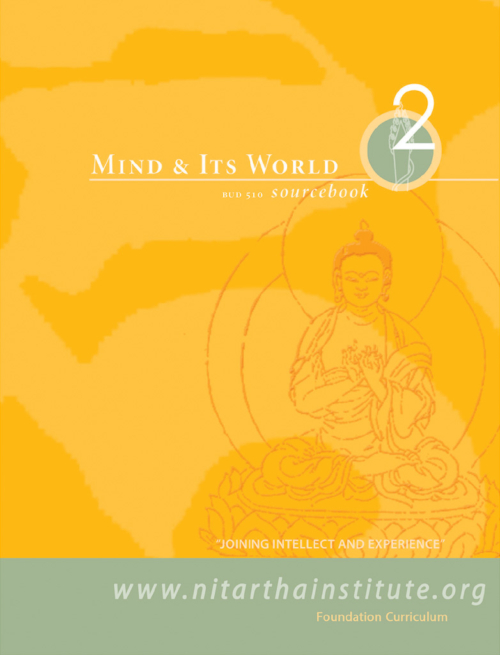 (ESPAÑOL) Mind and Its World II examines the theme of karma. It begins the study of causes and conditions as presented in Collected Topics, the twelve nidanas, or chain of interdependent origination, and the distinction between primary minds and mental factors. It includes a detailed presentation of the mental factors from the Classifications of Mind. Selected readings, analytical meditations, study questions, and review summaries are included in the sourcebook. Also available as an eBook for Apple or Android devices.
(ESPAÑOL) Mind and Its World II examines the theme of karma. It begins the study of causes and conditions as presented in Collected Topics, the twelve nidanas, or chain of interdependent origination, and the distinction between primary minds and mental factors. It includes a detailed presentation of the mental factors from the Classifications of Mind. Selected readings, analytical meditations, study questions, and review summaries are included in the sourcebook. Also available as an eBook for Apple or Android devices. -
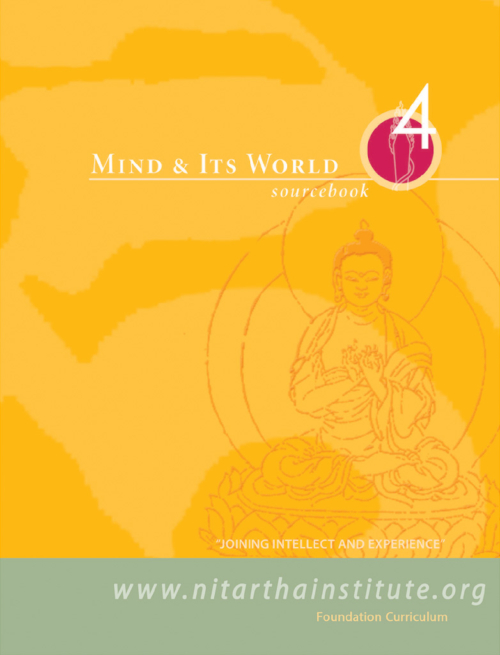
For Self-pace Online Course, students will be using the Mind and Its World IV, Provisional Draft; students must agree with the following policy before placing the order:
PROVISIONAL DRAFT COURSEWARE POLICY & ELECTRONIC FILE SHARING ARRANGEMENT:
- The cost of the Mind and Its World IV, Provisional Draft in the form of a PDF document is USD $23.10 and non-refundable. This amount will serve as a deposit payment towards the purchase of the final published version of the text. A discount coupon code will be issued to you for the purpose of purchasing the final version, valid for one year after the publication of the final text. Note: The coupon cannot be transferred to another person, it cannot be used to purchase other texts, and not valid for any ebook versions.
- You may use the Mind and Its World IV, Provisional Draft PDF for the duration of the class. However, once the course has concluded, usually determined by the expiration of access to the course video and audio recordings, you MUST delete the PDF file from your computer, as well as delete the email containing the PDF file attachment.
- If you prefer to work with a hardcopy of this text, you are welcome to print a copy for your own personal use,and would also need to be destroyed after use.
- At the end of the course, we will send an email reminder. At that time, you will be required to confirm by replying to the email, stating that the PDF file and hard copy have been deleted. Or, you may also proactively inform us that they have been deleted by sending an email to publications@nitarthainstitute.org
- If you prefer to not purchase the final version of the text, you are still required to delete/destroy the Mind and Its World IV, Provisional Draft , and no refund will be issued for deposit payment you made to access the Mind and Its World IV, Provisional Draft .
- If you decide to purchase this text, it fully means you have understood and agree with this policy.
- Once we receive your website order, we will email the PDF to your email address indicated in the website order. Please use the same email as the one you used for registration to Nitartha course. Please be allow 72 hours for processing.
For questions, please email us at publications@nitarthainstitute.org
Mind and Its World IV examines the two Hinayana philosophical tenet systems: the Vaibhashika and Sautrantika schools. Specific topics include the definitions of the two schools, a discussion of their subschools, an in-depth examination of their presentations of the process of perception and objects of knowledge. Also included is a description of the paths and fruition. Selected readings, analytical meditations, study questions, and review summaries are included in the sourcebook. -

ROOT TEXT
Madhyamaka is a potent and universally accessible means of calming our suffering and awakening to our innate wisdom. The Center of the Sunlit Sky artfully rescues this brilliant teaching from its unwarranted reputation for intellectual opacity and reinstates it as a supremely practical tool kit for everyday living. The aim of this book is to take Madhyamaka out of the purely intellectual corner into which it unjustly gets boxed. It is an attempt to show how Madhayamaka actually addresses and works with all of our experiences in life. The book follows the original Indian sources as well as the standard commentaries on Madhyamaka in the Kagyu School of Tibetan Buddhism. At the same time, these materials are adapted for a contemporary audience, combining the familiar sharpness of Madhyamaka reasonings (launching a massive assault on our cherished belief systems) with exploring the practical relevance of the Madhyamaka way of mind training. Also available as an eBook for Kindle devices. Note that the hardcopy book is shipped from the US. International customers may wish to explore local booksellers or Amazon.com to save on shipping cost. -
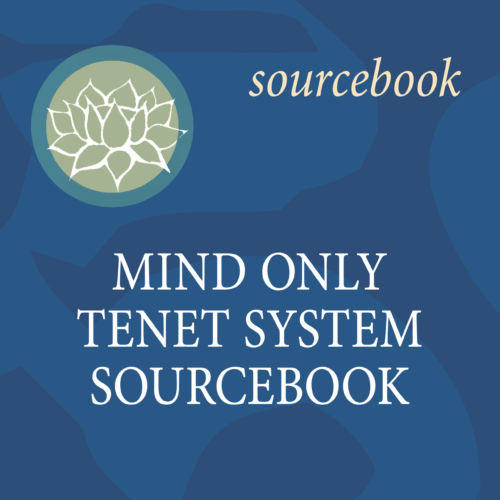 This sourcebook offers a systematic presentation of the Mind Only (Cittamātra) tenet system, one of the principal Mahāyāna philosophical schools. The Mind Only school emphasizes the doctrine that the subjective and objective poles of perception are not different in substance, but mental in nature. Specific topics include discussions on perception, the fundamental notion of “mind only,” the three natures, self-awareness, and the all-base consciousness. Also included is a brief discussion of the paths and the fruition. Selected readings, analytical meditations, study questions, and review charts are included in the sourcebook. Includes root text written by Acharya Lama Tenpa Gyaltsen.
This sourcebook offers a systematic presentation of the Mind Only (Cittamātra) tenet system, one of the principal Mahāyāna philosophical schools. The Mind Only school emphasizes the doctrine that the subjective and objective poles of perception are not different in substance, but mental in nature. Specific topics include discussions on perception, the fundamental notion of “mind only,” the three natures, self-awareness, and the all-base consciousness. Also included is a brief discussion of the paths and the fruition. Selected readings, analytical meditations, study questions, and review charts are included in the sourcebook. Includes root text written by Acharya Lama Tenpa Gyaltsen. -
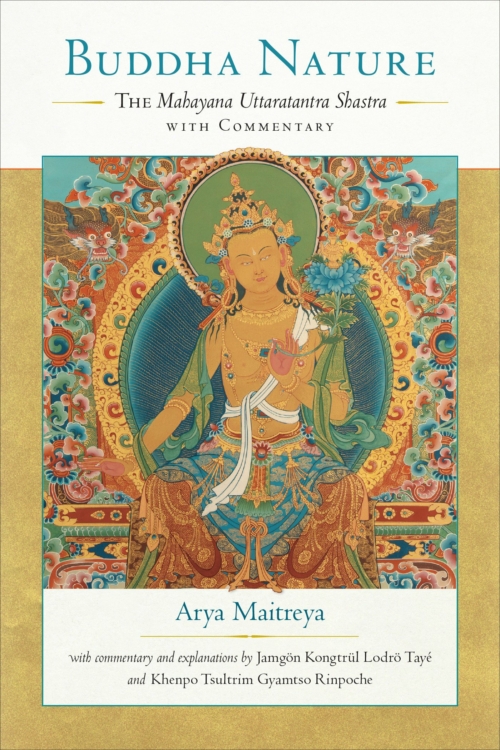
- Also available as an eBook for Apple or Android devices.
- The hardcopy book is shipped from the US. International customers may wish to explore local booksellers or Amazon.com to save on shipping cost.
Buddha Nature: The Mahayana Uttaratantra Shastra with Commentary by Maitreya, Jamgön Kongtrül Lodrö Tayé and Khenpo Tsültrim Gyamtso Rinpoche
Author: Arya Maitreya Commentary: Jamgön Kongtrül Lodrö Tayé and Khenpo Tsültrim Gyamtso Rinpoche Translator: Rosemary Fuchs
All sentient beings, without exception, have buddha nature—the inherent purity and perfection of the mind, untouched by changing mental states. Thus there is neither any reason for conceit nor self-contempt. This is obscured by veils that are removable and do not touch the inherent purity and perfection of the nature of the mind. The Mahayana Uttaratantra Shastra, one of the “Five Treatises” said to have been dictated to Asanga by the Bodhisattva Maitreya, presents the Buddha’s definitive teachings on how we should understand this ground of enlightenment and clarifies the nature and qualities of buddhahood. This seminal text details with great clarity the view that forms the basis for Vajrayana, and especially Mahamudra, practice. -
Out of stock
 an enamel lapel pin with DHĪḤ, the seed syllable of Manjushri, bodhisattva of wisdom
an enamel lapel pin with DHĪḤ, the seed syllable of Manjushri, bodhisattva of wisdom -
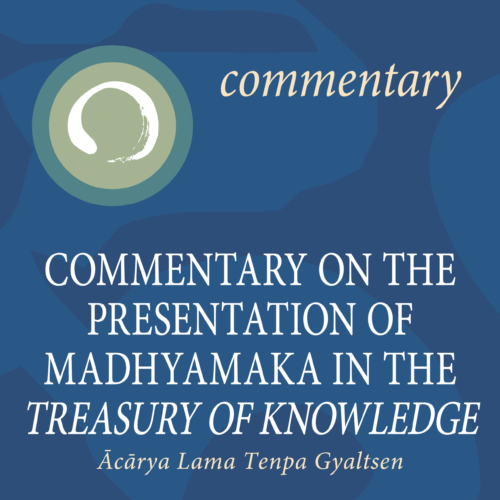
Author: Acharya Lama Tenpa Gyaltsen
A presentation of the philosophical tenets of the Madhyamaka tradition of the Mahayana. Based on sections of Jamgön Kongtrul’s Lodrö Thaye’s Treasury of Knowledge, this text focuses on the Madhyamaka presentation of the two truths, the views of the subschools of the tradition (Prasangika and Svatantrika), and the fundamental understanding of emptiness. Includes root text and commentary by Jamgön Kongtrul Lodrö Thaye, translated by Karl Brunnhölzl. -
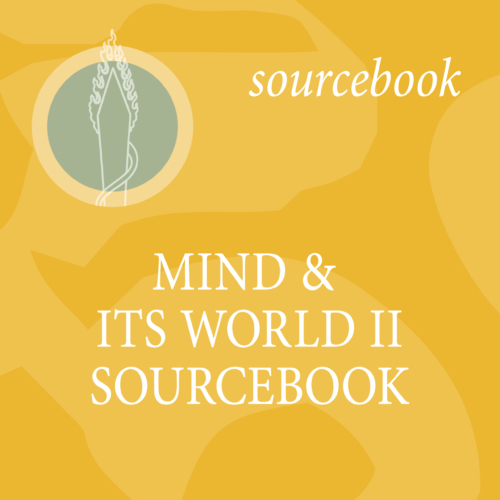 Also available as an eBook for Apple and Google. Mind and Its World II examines the theme of karma. It begins the study of causes and conditions as presented in Collected Topics, the twelve nidanas, or chain of interdependent origination, and the distinction between primary minds and mental factors. It includes a detailed presentation of the mental factors from the Classifications of Mind. Selected readings, analytical meditations, study questions, and review summaries are included in the sourcebook.
Also available as an eBook for Apple and Google. Mind and Its World II examines the theme of karma. It begins the study of causes and conditions as presented in Collected Topics, the twelve nidanas, or chain of interdependent origination, and the distinction between primary minds and mental factors. It includes a detailed presentation of the mental factors from the Classifications of Mind. Selected readings, analytical meditations, study questions, and review summaries are included in the sourcebook. -
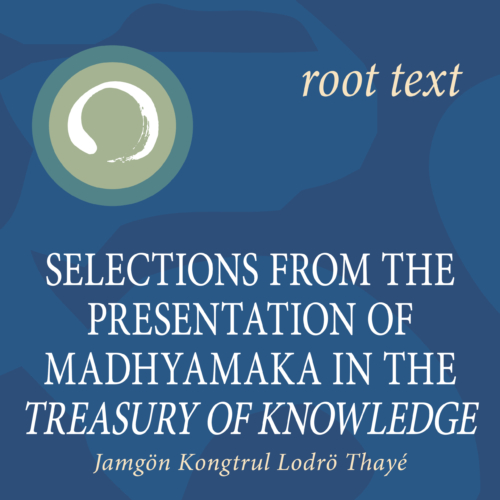
Author: Jamgön Kongtrul Lodrö Thayé Translator: Karl Brunnhölzl
A root text based on sections of Jamgön Kongtrul Lodrö Thaye’s Treasury of Knowledge. It systematically presents the Madhyamaka view of the two truths, the assertions of the subschools of the tradition, and formulates the emptiness reasonings.
